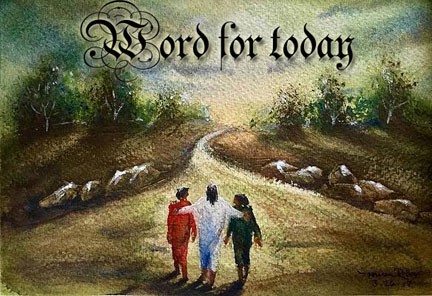Watch
Events
Articles
Market
More
If #israel endures, it isn't because Israel is worthy. It's because God keeps His promises. Humble yourself, repent from sin, and God will return to you.
God wants His people to prosper because that reflects well on Him, but He isn't going to stop being a righteous God just so we can prosper in our sin.
Malachi 3



I Started waking up to allot of truth in 2020, exploring torah in 2023. I left Christian church officially 2024. Still learning but I believe torah is wisdom and our Standart for living.
I believe the father's name is Yahuah, our messiah name is Yahusha.
I currently follow zadok calendar according to the books of Enoch and jubilees and honor Saturday shabbat. I don't do worldly pagan holidays. I also believe historical context and common sense should be considered when studying and applying torah.
I believe the father, son and ruach (chakmah/wisdom) are 3 separate entities with the same will and purpose. The son and ruach both operating under the authority and will of the father, Yahuah, most high. Chakmah being our spiritual mother, the son/messiah being the heir of the throne. I'm also exploring the evidence to decide weather Paul is a self appointed false apostle, or if he just greatly misunderstood.
That being said, I also believe that everything is not black and white, some topics and personal situations are complex. We are living in a broken world that is seperated far from Yah. And father is well aware of that. I am unequally yoked, been with my husband 12 yrs. Doing the best I can in my situation, following the Father's lead. Our 16yr of son is also seeking torah with me.
If anyone reading this is seeking for fellowship, feel free to reach out. I'm looking for friends and fellowship in okanogan county washington.



https://www.hostmoves.com/
Get an affordable hosting solution or transfer a site you already have.
We have slashed prices greatly while still giving top support. I set up the accounts and handle support tickets personally. You are getting the highest support available



Drink no wine or strong drink, you or your sons with you, when you go into the tent of meeting, lest you die. It shall be a statute forever throughout your generations.
#leviticus 10:9
No mind-altering drugs are allowed in priestly rituals. No alcohol, prozac, cannibis, or shrooms for the Cohen on duty. Although the command explicitly applies only to the sons of Aaron, I believe all leaders of corporate worship should follow this principle.
#shemini



Drink no wine or strong drink, you or your sons with you, when you go into the tent of meeting, lest you die. It shall be a statute forever throughout your generations.
#leviticus 10:9
No mind-altering drugs are allowed in priestly rituals. No alcohol, prozac, cannibis, or shrooms for the Cohen on duty. Although the command explicitly applies only to the sons of Aaron, I believe all leaders of corporate worship should follow this principle.
#shemini



So they came near and carried them in their coats out of the camp, as Moses had said.
#leviticus 10:5 #shmini
Nadab and Abihu were consumed by fire from Heaven. This verse indicates that there was something left of them, enough to carry away, at least. Either the Levites used the coats because they didn't want to become unclean by touching a corpse, or there wasn't enough of the dead men to carry them any other way.



Good day beloved
check out our latest #newsletter
I trust that you will enjoy reading it
🙌🏾🍇🫓🏞
https://reachingallnationsfory....ah.blogspot.com/2025



Today is the 5th day of the Omer
Meaning of Numbers: The Number 5
What is the promise of 5?
"Five of you shall chase a thousand, and a hundred of you shall put ten thousand to flight" (Leviticus 26:8), conveys the truth elsewhere revealed; - "If God be for us who can be against us?" (Romans 8:31). But note, it does not say "five shall chase a thousand"; but "five OF YOU," - 5 of those whom God has redeemed and delivered, and whom He will strengthen with His own might.
The number 5 many times symbolizes God's grace, goodness and favor toward humans. Since five represents grace, when its multiplied by itself, it produces 25 which means "grace upon grace."
The Tabernacle has this number of grace (5) stamped upon it.
The outer court was 100 cubits long and 50 cubits wide. On either side were 20 pillars, and along each end were 10 pillars, or 60 in all; that is 5 x 12, or grace in governmental display before the world, 12 being the number of the Tribes.
What were the 5 special ingredients of Holy anointing oil?
The Holy anointing oil (Exodus 30:23-25) was composed of five parts, for it was a revelation of pure grace. This five is marked by the numbers four and one. For four parts were spices, and one was oil.
The four principal species: -
1. Myrrh, 500 shekels ( 5 x 100).
2. Sweet cinnamon, 250 shekels ( 5 x 50).
3. Sweet calamus, 250 shekels (5x50).
4. Cassia, 500 shekels ( 5 x 100).
And (5) olive oil, one hin.
BA-RUCH A-TAH ADO-NAI E-LO-HE-NU ME-LECH HA-OLAM ASHER KID-E-SHA-NU BE-MITZ-VO-TAV VETZI-VA-NU AL SEFI-RAT HA-OMER.
Blessed are You, Lord our God, King of the Universe, who has sanctified us with His commandments, and commanded us concerning the counting of the Omer.
May the Merciful One restore unto us the service of the Bet Hamikdash to its place, speedily in our days; Amen, Selah.



